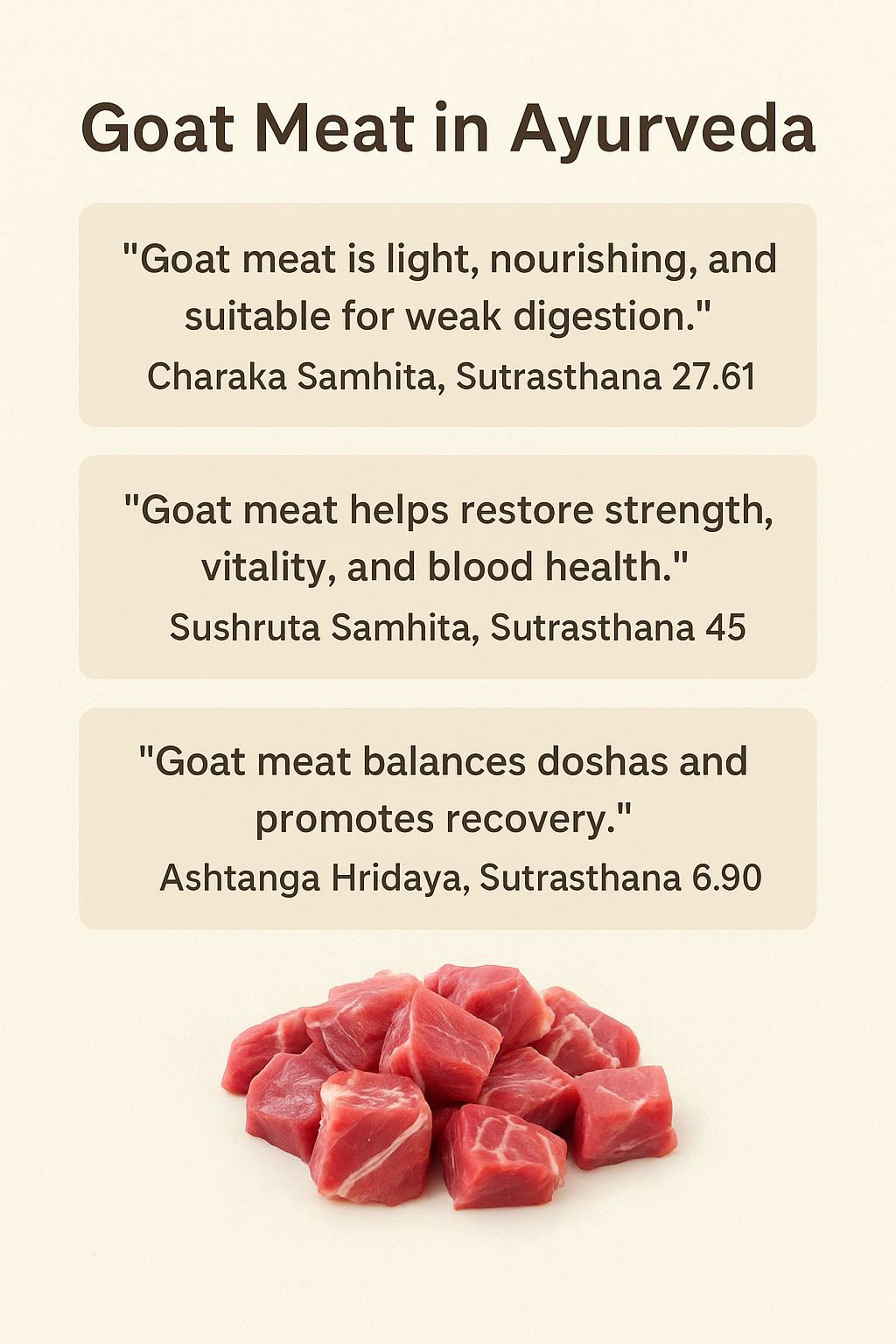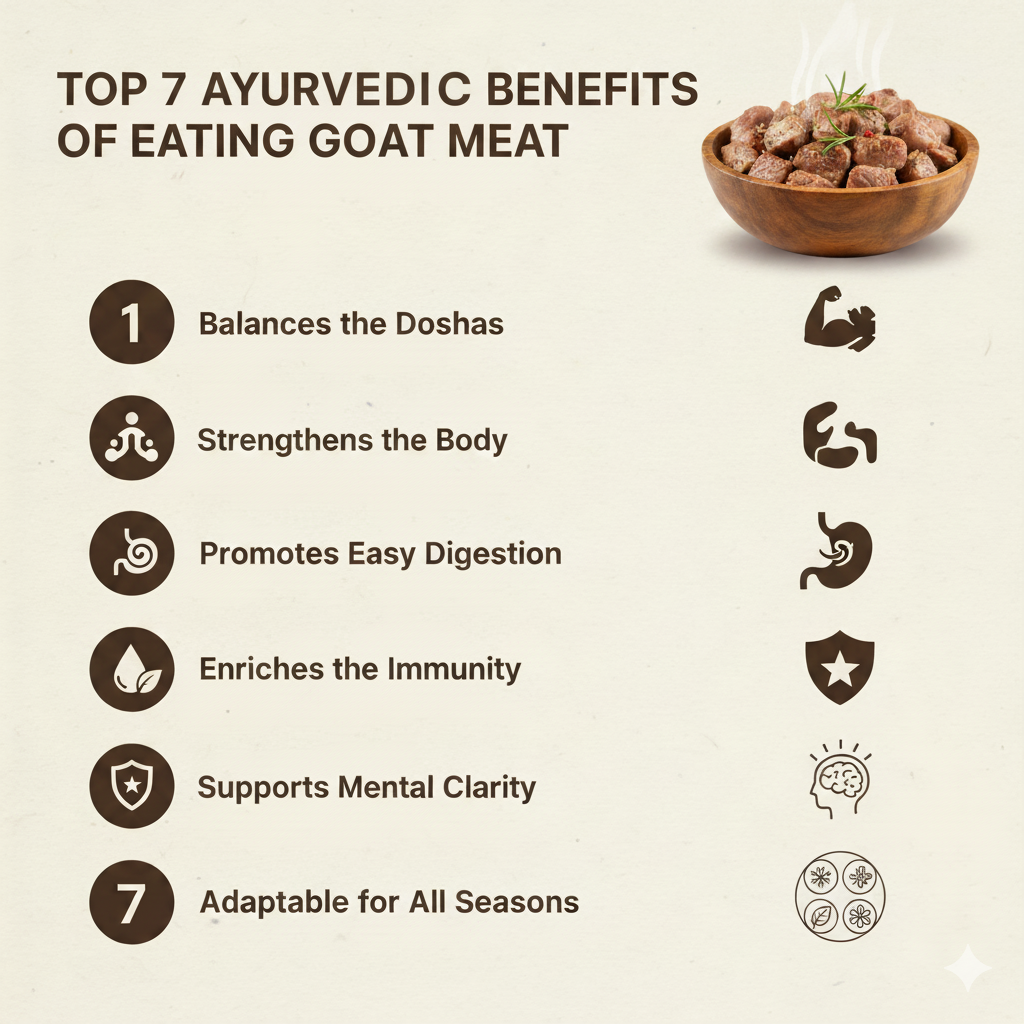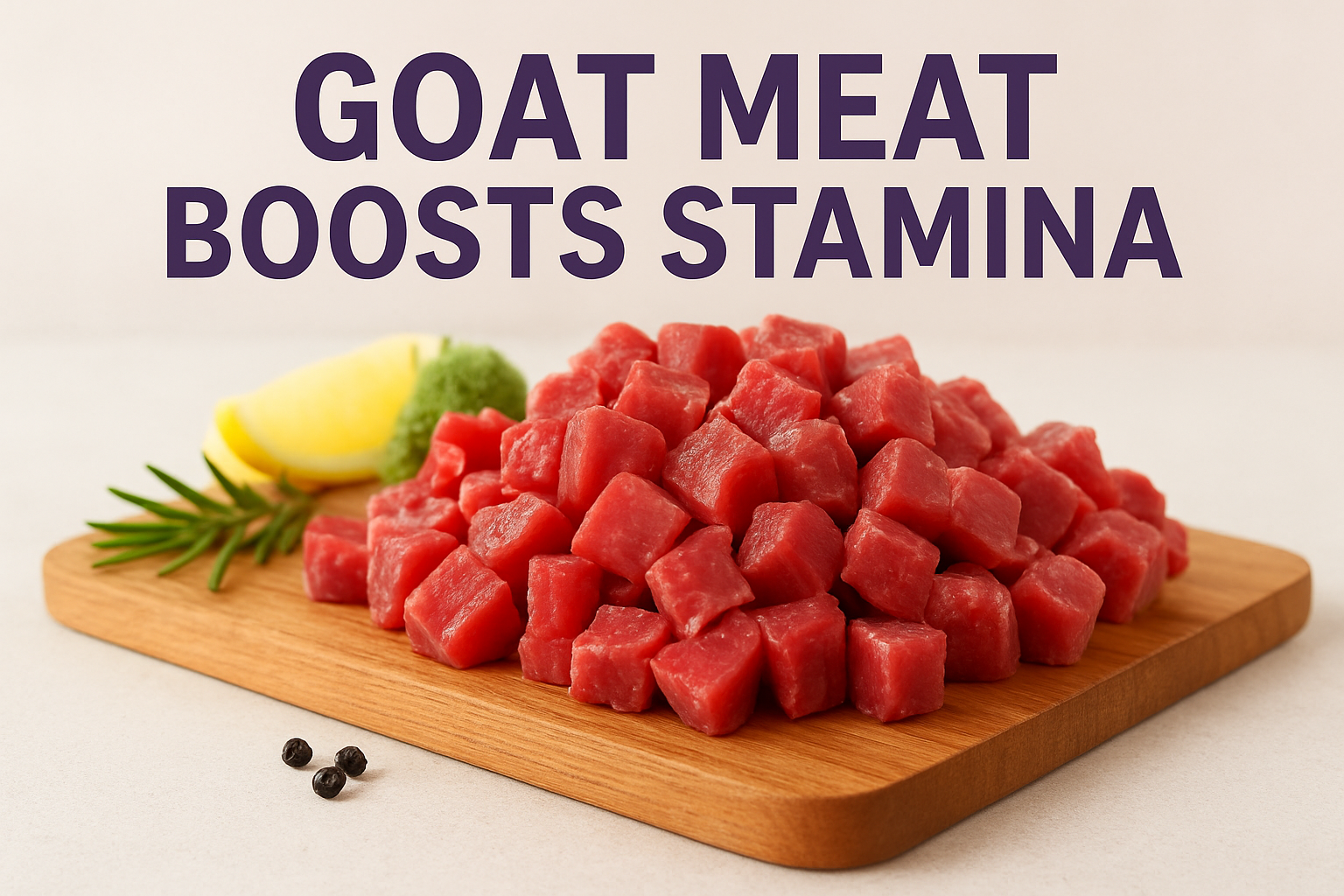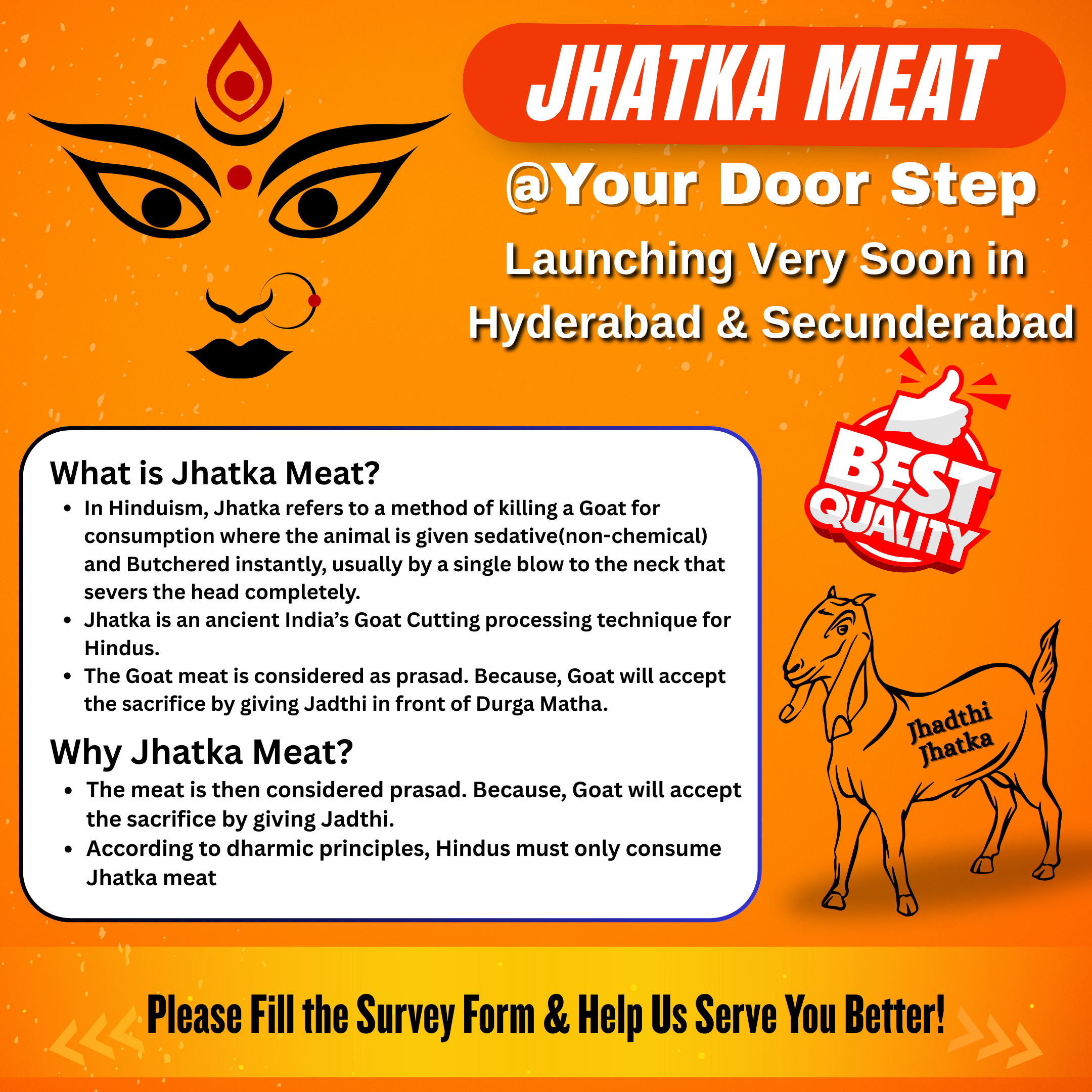Goat Meat in Ayurveda
Ayurveda, the 5,000-year-old Indian science of life, emphasizes that food is the first medicine. In fact, among different meats, goat meat holds a special place in Ayurveda because of its healing, nourishing, and strengthening qualities. Unlike other red meats, goat meat is considered light, easily digestible, and packed with vital nutrients that balance the body’s energies. (EasyAyurveda – Goat Meat Benefits per Ayurveda)
At Jai Bhavani’s Jhatka Meat, we deliver 100% fresh, pure Jhatka male goat meat, which aligns perfectly with Ayurveda’s principle of consuming natural, wholesome foods. Therefore, every cut we provide is more than just food – it’s medicine for the body.
🪔 Ayurvedic View of Goat Meat
In Ayurveda, foods are categorized based on their effects on the three doshas: Vata, Pitta, and Kapha. Specifically, goat meat is:
-
Balancing for Vata: Provides warmth, strength, and stability.
-
Neutral for Pitta: Does not excessively heat the body like other red meats.
-
Light for Kapha: Unlike fatty meats, goat meat doesn’t cause heaviness or sluggishness.
👉 Consequently, this makes goat meat suitable for most body types, and it becomes a recommended protein source in Ayurvedic diets. (Charaka Samhita – Sutrasthana 27)
💪 Goat Meat for Strength and Healing
Ayurvedic texts praise goat meat for its ability to restore strength, heal weakness, and promote vitality. Moreover, it is especially recommended for:
-
People recovering from illness or surgery.
-
Children in their growth phase with natural protein.
-
Athletes and working professionals who need stamina.
-
Anyone who needs stronger immunity by nourishing body tissues (dhatus).
In fact, many Ayurvedic practitioners suggest goat meat soup as a healing tonic for weak digestion, anemia, or postpartum recovery. (The Ayurveda Experience – Meat Use in Ayurveda)
🔥 Why Goat Meat is Light and Digestible
Unlike lamb or beef, goat meat is lean and contains very little fat. As a result, Ayurveda recognizes it as mamsa (meat) that is easy to digest when cooked properly. (EasyAyurveda – Charaka Food Classification)
-
Stews, soups, and light curries are ideal Ayurvedic preparations.
-
Goat meat digests well without causing heaviness or sluggishness.
-
Its natural warmth supports circulation and energy.
👉 Therefore, goat meat is often given to patients recovering from weakness instead of heavier meats.
🌿 Goat Meat and Blood Nourishment
Ayurveda places importance on Rakta Dhatu (blood tissue), which carries life force throughout the body. Accordingly, goat meat is considered rakta-vardhak (blood-nourishing).
-
Rich in iron, it helps prevent anemia.
-
Supports women’s health during pregnancy and postpartum recovery.
-
Improves oxygen supply, boosting stamina and vitality.
Thus, this natural blood-enriching property makes goat meat an Ayurvedic superfood.
🧘 Goat Meat for Energy and Longevity
Ayurvedic principles highlight goat meat as a source of Ojas – the subtle energy that promotes immunity, vitality, and longevity.
-
Builds resilience against diseases.
-
Improves concentration and mental clarity.
-
Enhances reproductive strength and fertility.
Consequently, regular consumption of goat meat, in moderation, supports an active, energetic lifestyle without the drawbacks of heavier red meats.
🌸 Goat Meat for Seasonal Balance
Ayurveda also teaches us to eat according to seasons (Ritu Charya). Therefore, goat meat plays an important role across different climates:
-
In winter, it provides warmth and strength to withstand cold weather.
-
In monsoon, light goat meat soups prevent sluggishness and boost immunity.
-
In summer, moderate consumption keeps energy steady without overheating the body.
👉 This adaptability across seasons makes goat meat one of the most versatile foods in the Ayurvedic diet.
🥣 Ayurvedic Recipes with Goat Meat
Some traditional Ayurvedic preparations include:
-
Goat Meat Soup (Mutton Yakhni): A light, healing tonic.
-
Goat Meat Stew with Herbs: Cooked slowly with spices like cumin, coriander, and black pepper.
-
Goat Meat Paya (Bone Broth): Excellent for joint health and recovery.
Notably, these recipes focus on slow cooking, natural spices, and minimal oil — making them wholesome and easy to digest.
✅ Why Jhatka Goat Meat Aligns with Ayurveda
Not all goat meat is the same. Since Ayurveda emphasizes purity, freshness, and natural preparation — Jhatka goat meat is the perfect match.
-
Fresh, never frozen – preserving nutrients and vitality.
-
100% Male Goat Meat – tender, light, and naturally rich.
-
Jhatka method – ensures purity, no stress toxins in the meat.
👉 Accordingly, Jai Bhavani’s Jhatka Meat becomes the perfect fit for an Ayurvedic lifestyle.
📊 Nutrition Snapshot (per 100g of Goat Meat)
-
Calories: 143 kcal
-
Protein: 27g
-
Fat: 3g
-
Iron: Rich source
-
Vitamin B12, Zinc, Selenium – Energy and immunity boosters
Therefore, goat meat is a nutrient-dense food that naturally supports health and stamina.
📜 Authentic Ayurvedic References
To support these claims, Ayurvedic classics mention goat meat (aja-mamsa):
-
Charaka Samhita, Sutrasthana 27.61: Goat meat is light, nourishing, and suitable for weak digestion. (Read here)
-
Sushruta Samhita, Sutrasthana 45: Goat meat helps restore strength, vitality, and blood health.
-
Ashtanga Hridaya, Sutrasthana 6.90: Goat meat balances doshas and promotes recovery.
👉 Thus, these references confirm that Ayurveda has long recognized goat meat as healing and restorative.
🕉️ Conclusion – Ayurveda’s Gift of Goat Meat
Ayurveda teaches us that food is not just fuel, but medicine for the body and soul. Accordingly, goat meat, when consumed fresh and pure, provides strength, stamina, and balance to all doshas. It adapts across seasons, supports recovery, enriches blood, and builds natural energy.
At Jai Bhavani’s Jhatka Meat, we ensure that every cut of goat meat is hygienic, nutrient-rich, and aligned with Ayurveda’s wisdom.
🥩 Switch to natural healing with Jhatka goat meat today – a timeless tradition that supports health, vitality, and long life.
📞 Order Now – Freshness Delivered 24/7!
🌐 www.jaibhavanisjhatkameat.com/shop




Leave A Comment